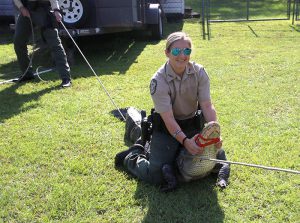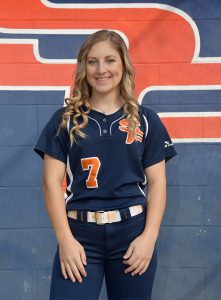- Welcome
- Campus Maps
- History
- Mission Statement
- Accreditation
- Administration
- Employment
- Human Resources Employment Process FAQ
- Position Vacancies
- Salary Schedule (PDF)
- Employee Benefits
- Paid Holidays
- Employee Handbook (PDF)
- BENCOR Special Pay Plan (PDF)
- Social Security Collection and Usage
- Affordable Care Act Notice (PDF)
- Social Security Disclosure Summary (PDF)
- Tobacco-Free College
- Drug Free Workplace & Campuses
- Technology Usage Acknowledgement (PDF)
- Employee Safety Manual (PDF)
- SFSC’s Annual Security and Fire Safety Report (PDF)
- Calendars
- News
- Social Media
- Honoring Our Retirees
- Celebrating Our Trustees
AVON PARK, Fla. – Sept. 25, 2023 – Angela Shope’s heart was in law enforcement but not in the traditional sense. Ultimately, she wanted to combine it with conservation and now she’s a law enforcement officer with the Florida Fish and Wildlife Conservation Commission (FWC).
Shope graduated from South Florida State College (SFSC) with an Associate in Arts and an Associate in Science in Criminal Justice Technology in May 2021. She grew up in Lake Butler, a town in northeastern Florida with a population of approximately 2,000. It borders a lake and sits at the head of the 47-mile Palatka-Lake Butler State Trail.
Shope developed a passion for conservation at a young age, while helping her mother who worked in forestry at the Osceola National Forest. “I knew that I wanted to be a game warden from day one,” she said. “I knew that there was no other job better for me that combined all of my passions.”
Shope first approached an FWC recruiter when she was 18 years old and learned that she needed to be 20 before she could apply to the agency. Because working with the FWC was her dream job, she maintained contact with the recruiter.
In the meantime, Shope joined the local police department working as a dispatcher while she waited for the FWC application period to open up. “As a dispatcher, you sit and listen,” she said. “The police department would get calls for anything from a car accident to a robbery. I knew in my heart that I wanted to be out in the field helping.”
Shope’s application was accepted by the FWC in October 2022. The first four and a half months at FWC, applicants attend an academy, where they are trained to be law enforcement officers. “You have to learn how to be a cop,” said FWC Officer Ron Howard, who is the agency’s southwest region recruiter. “You learn what you can and cannot do, the rules, the regulations, the Florida statutes, the limits of your authority in Florida. Once you have that as your base, you take your test, you pass your state certification exam, and then you’re certified by the Florida Department of Law Enforcement to be a law enforcement officer in Florida.”
The employees in training are, then, given their badge, their gun, and sent to six to seven months of training in Tallahassee. “That’s when we do the fun stuff,” Howard said, “like boating, fish and wildlife, off-road driving, man tracking, and everything that makes you a conservation officer.”
The list of responsibilities of a law enforcement officer with FWC seem endless. According to the agency website, some of those responsibilities are to enforce state and federal fisheries and wildlife laws, protect endangered species and habitat, enforce state and federal environmental laws, protect state lands and water quality, investigate fish and wildlife and environmental crimes, enforce boating rules and regulations, conduct boating accident investigations, investigate vessel theft and title fraud, respond to natural and man-made disasters, conduct search-and-rescue missions, and educate the public.
“FWC is a proactive agency rather than reactive,” Shope said. “I have the opportunity to travel to different places to do my job. My territory – Baker and Union counties – is land locked; therefore, my lieutenant allows me and the others on my squad to travel to work inshore saltwater. I can run the boat and do vessel stops, conduct safety inspections, and enforce Florida’s fresh and saltwater fish regulations. Within the agency, I have the opportunity to work details, like on holidays, and assist other states when disasters hit, such as for hurricane relief. The animals are a big part of my decision to join FWC rather than work in a more traditional law enforcement job. I have worked with a local biologist in capturing and rehabilitating a black bear. I got to set free a spotted whitetail fawn that someone was keeping in captivity.”
As would be expected, Shope’s workday is varied and exciting. “My day can go from zero to 100 from the moment I begin. One day I’m scheduled for training and the next I could be working with a biologist on an injured animal, serving a warrant, relocating an alligator, on a search-and-rescue mission, conducting vessel patrol, boating under the influence enforcement, public outreach, or patrolling the national forest in my area by land or by helicopter.”
Shope’s other passion is softball. In fact, she started as a center fielder for the SFSC Lady Panther Softball team, then played third base in her sophomore year. She brings her softball experience to her job.
“Sports changed me as a person,” Shope said. “Softball is a game, but it teaches you many life lessons – teamwork, leadership, juggling and balancing multiple tasks at once, friendship, and trust. While in college, Coach Carlos Falla [SFSC softball coach] would always tell us, ‘When we’re on the field, we’re going to work hard. You have to work hard to win, but we’re also there to have fun.’ It’s not all about winning, but having fun and learning those life lessons to carry into the future and have that toolbox; you can look back on your experience.”
Howard has said that Shope was an excellent candidate for FWC from the first time he met her. “She was assertive, she could talk to people, and she had all the other qualities that you’re looking for in an applicant,” he said. “I visit SFSC for recruiting from time to time and had seen Angela assisting an organization by passing out pizza. She didn’t have to be there, but she was giving back. People in the civil service sector are usually those who like to volunteer and help. She was into agriculture and she’s an athlete. We’re really big on fitness. It’s important to bring somebody in who’s going to pride themselves on staying fit and keeping up with and helping other officers. Angela is someone who can do that.”
Shope is proud and enthusiastic about the education she received at SFSC. “One thing I like about SFSC was coming from a small high school that had small class sizes and SFSC has small class sizes and instructors are encouraging and always willing to lend a helping hand,” said Shope. “The environment was just amazing, and you meet so many different people and have an opportunity to learn so many different things.”
When asked how she might encourage others to pursue an education, Shope acknowledged that people may have perceived barriers to attending college. “The first thing people think is ‘It’s too expensive’ or ‘I don’t know where to start,’” she said. “It’s overwhelming at first. But college can be affordable. I decided that I wanted to play softball, so I worked really hard to get my softball scholarship to play at SFSC. If you do well in high school, you can get academic scholarships.”
And Shope has a favorite saying: Endeavor to Persevere. “What it means to me,” she said, “is to pursue your dreams and always have another one. Don’t settle, and be aware of what you can do and what you can’t do. Always push yourself and believe in yourself.”






